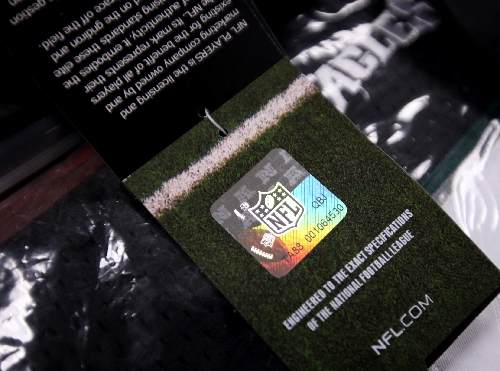Federal agents halt sales of counterfeit goods one NFL jersey at a time
As far as counterfeit cases go, this was peanuts, really.
Usually, the U.S. attorney general's office requires at least $1 million in seized counterfeit goods to prosecute.
And this? This latest seizure about a month ago by federal agents in Las Vegas?
This was just a bunch of football jerseys, sent from China to Las Vegas, with a stopover in Anchorage, Alaska.
It was in Anchorage where a shivering federal agent took one look at the shipment, read the customs declaration, smelled a rat and ripped right into the shipment.
His hunch was correct.
The box didn't contain a bunch of T-shirts and jackets, as the Chinese online clothing company falsely declared.
Instead, inside were all sorts of NFL jerseys for current and former players such as Peyton Manning of the Denver Broncos, Emmitt Smith of the Dallas Cowboys, Aaron Rodgers of the Green Bay Packers, Troy Polamalu of the Pittsburgh Steelers. The numbers on the back were even right.
It was enough to make football aficionados salivate with their Buffalo wings and beer - if they could ignore the jerseys were obvious knockoffs, with threads hanging and patches for names.
And the Henderson man who was the intended receiver of this trans-Pacific pass?
A visit from Las Vegas-based federal agents let him know it had been intercepted.
"He was just a kid, no more than 22 years old, unemployed, still living with his parents," said Steven Sampilo, who, with fellow agent Michael Stevenson, went knocking on the family's front door. "He was pretty apologetic."
Said Stevenson: "It's not every day you get federal agents knocking on your door. He promised he wouldn't do it again."
He claimed ignorance all along and said he thought it was simply a good deal: 44 jerseys at $20 a pop. When purchased legit, the jerseys can cost as much as $100 each.
The young guy said he planned to sell some of them on Craigslist, which is always a red flag. He shouldn't have breathed that word.
While he missed the million-dollar threshold for prosecution, agents are using his story as an example of the federal government turning up the heat on violators of the Intellectual Property Right law.
Homeland Security Investigations, with U.S. Customs and Enforcement, is trying to put a stop to those who either produce, sell or buy counterfeit goods. One program was called Operation Holiday Hoax.
Mexico has entered the fray once again after its success last year in cutting off 10 tons of used clothing, cigarettes, electronics, tools and DVDs, according to the Intellectual Property Rights Center in Washington, D.C.
"The counterfeiting and piracy epidemic continues to spread around the world," said Lev Kubiak, director of the center. "Our partnership with the government of Mexico and the rest of our partners shows that this is a problem that affects everyone in the world, not just the United States. Together, we will continue to deliver blow after blow to criminals worldwide, making a positive impact on American jobs here at home."
For many who buy the inexpensive goods, it sometimes is hard to make the connection that the American consumers who either actively or mistakenly buy the goods are, in effect, contributing to a lousier economy at the expense of saving a buck, said Michael A. Harris, assistant special agent in charge for Homeland Security Investigations in Las Vegas.
"Everybody loses when somebody buys counterfeit products," he said. "The American consumer is getting a shoddy product, real taxes aren't being paid because often it's coming from another country, and jobs are being lost because the counterfeit goods are flooding the market and nobody at home is making them."
Contact reporter Tom Ragan at tragan@reviewjournal.com or 702-224-5512.


















